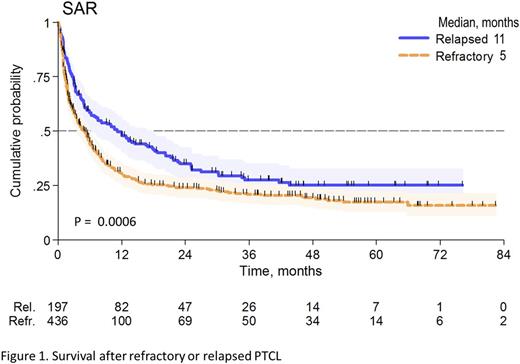Abstract
Introduction: Current treatment strategies for mature or peripheral T-cell lymphomas (PTCL) patients (pts) are largely unsatisfactory. In particular, pts failing first line therapy are expected to have a dismal outcome. The purpose of the present analysis was to analyze clinical features and explore factors influencing survival of pts with primary refractory or relapsed PTCL retrieved from a prospective registry, the T-cell Project.
Methods: In this study, data were extracted from cases of newly diagnosed PTCL registered by 74 institutions world-wide in the T-cell Project and on whom baseline data, information on first line treatment, response to initial therapy, time to relapse and salvage treatment were available. For this analysis, refractory disease (Ref) was defined as no response to initial treatment or unsatisfactory partial remission (PR) requiring salvage therapy immediately after completing frontline treatment. Relapsed disease (Rel) was defined as progression at least one month from completion of front line therapy in pts who achieved a complete remission (CR) or PR.
Results: Of the 1020 cases reviewed, 83 (8%) received palliative treatment and were excluded from this analysis. Out of 937 who received an active treatment (92%), 436 were classified as Ref (47%) and 197 as Rel (21%). Median time to relapse was 8 months (range 2-73 months). Overall, 77%, 73%, 59% and 45% of PTCL-NOS, AITL, ALCL alk- and ALCL alk+ were Rel/Ref, respectively. Forty-four percent of the pts were at high-risk according to PIT and 45% according to IPI. All but 3 pts received combination chemotherapy and 34 (5%) were consolidated with high dose therapy (HDT) in first remission. Additionally, 99 (16%) pts received HDT as part of salvage treatment. After a median follow-up from documentation of Rel/Ref disease of 38 months (range 1-96 months), 440 patients had died. The median survival after Rel/Ref disease (SAR) was 5.8 months (95% CI 4.9-7.2 months). At 3 years, the SAR was 28% for Rel (95% CI 21-35%) and 21% (95% CI 17-25%) for Ref (p<0.001) (Figure 1). Patients responding to salvage therapy and consolidated with autologous stem cell transplantation (ASCT) had a 3 year SAR of 48% (95% CI 37-58) with an HR of 0.36 (95% CI 0.26-0.48) compared to pts not treated with HDT (p<0.001). In a univariate Cox regression analysis, Ref disease was associated with a higher risk of death (HR=2.14, 1.69-2.69, p<0.001), whereas late relapse (>12 months, HR 0.54, 95% CI 0.39-0.75, p<0.001) and salvage therapy with ASCT (HR=0.35, 95% CI 0.26-0.48, p<0.001) were associated with a better outcome. No difference was found in outcomes for Rel/Ref pts with respect to histology.
Conclusion: The T-cell Project represents the largest cohort of prospectively collected data on pts with aggressive T-cell lymphomas and accurately reflects outcomes for pts treated according to standards of care around the world. We demonstrate that the SAR of pts with Rel/Ref PTCL remains dismal. Rel pts had a better outcome than those with primary Ref disease. While ASCT appeared to be beneficial for Rel/Ref pts, only a small percentage of pts were able to undergo transplant. These results highlight the urgent need for novel agents and more effective salvage therapies. Clinical trials are underway exploring the activity of novel agents in combination with chemotherapy to improve overall response in the front line, and single agent and combination studies of novel agents are underway for patients with Rel/Ref disease.
Horwitz:Spectrum: Consultancy, Research Funding; Seattle Genetics: Consultancy, Research Funding; Kyowa Hakka Kirin: Consultancy, Research Funding; Celgene: Consultancy, Research Funding; Takeda Pharmaceuticals International Co.: Consultancy, Research Funding; Infinity: Research Funding; Huya: Consultancy; FortySeven: Consultancy. Montoto:Gilead: Research Funding; Roche: Honoraria. Moskowitz:Merck: Honoraria; Bristol Myers Squibb: Honoraria; Seattle Genetics: Honoraria, Research Funding. Spina:Mundipharma: Membership on an entity's Board of Directors or advisory committees, Other: Speaker Fee; Teva Pharmaceuticals Industries: Membership on an entity's Board of Directors or advisory committees, Other: Speaker Fee. Federico:MedNet Solutions: Consultancy.
Author notes
Asterisk with author names denotes non-ASH members.


This feature is available to Subscribers Only
Sign In or Create an Account Close Modal